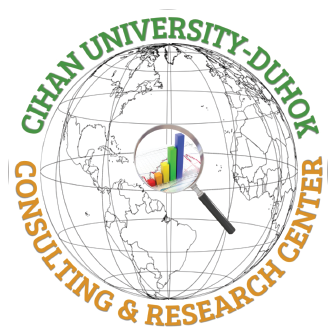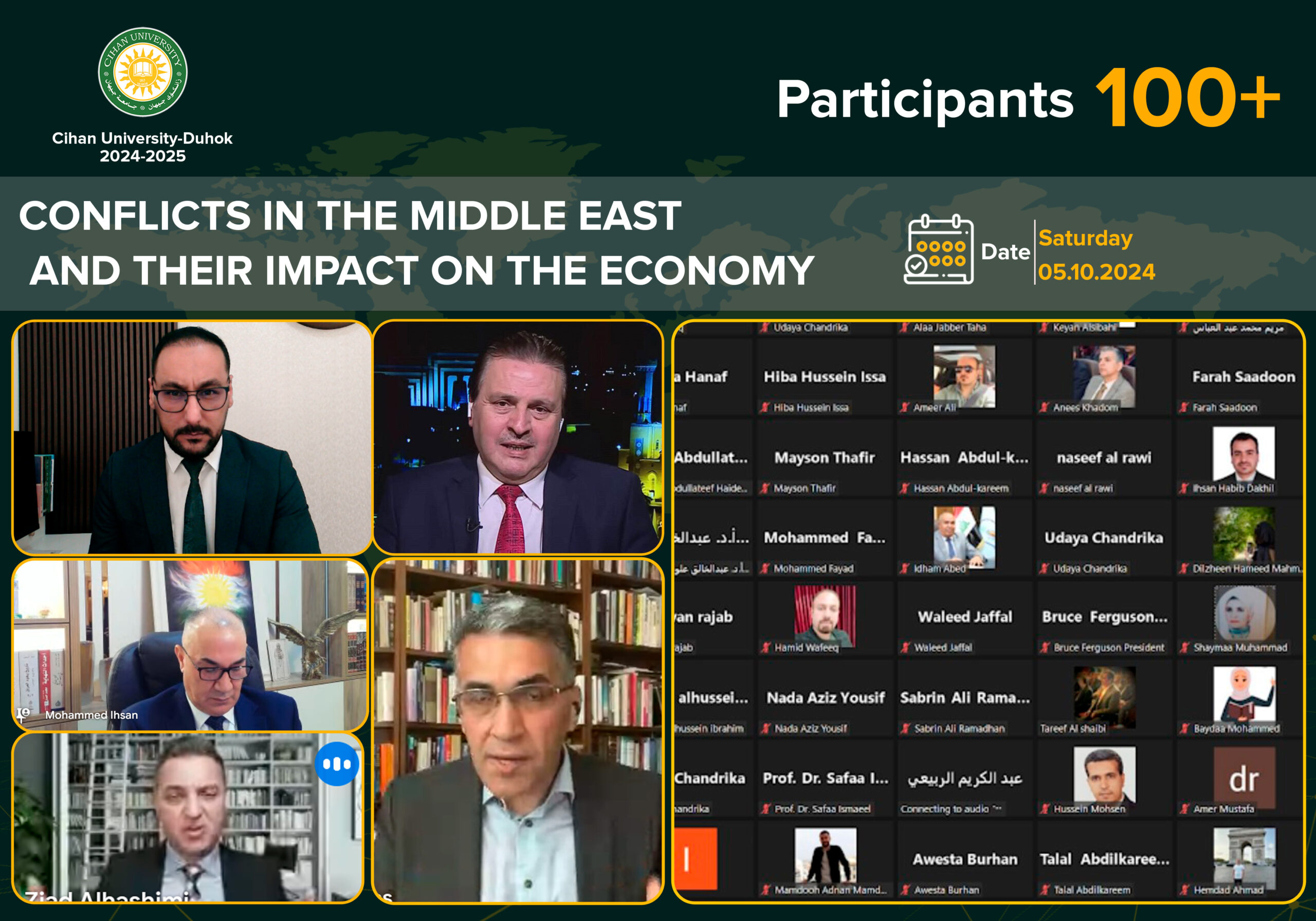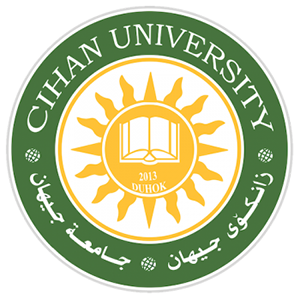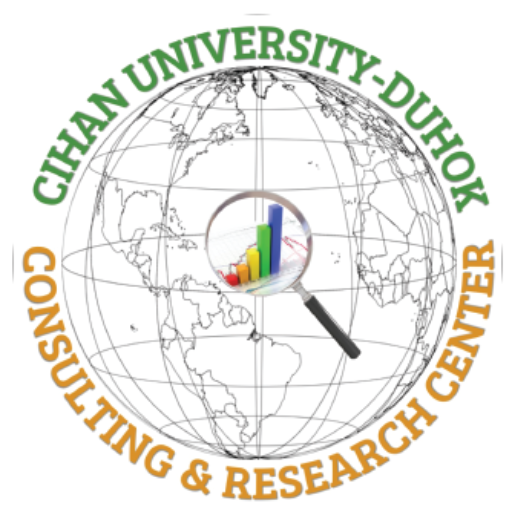The Consulting & Research Centre at Cihan University – Duhok organized an international online workshop on Saturday, October 5, 2024, entitled “Conflicts in the Middle East and Their Impact on the Economy.” In the presence of the university president Prof. Dr. Zeravan Abdulmuhsen Asaad, The workshop was moderated by Dr. Nawar Al-Saadi, Head of the Research Center, and attracted more than 100 participants, including prominent political, economic, and media figures from various countries.
The workshop was conducted via Google Meet and focused on three key areas related to the security, political, and economic implications of ongoing conflicts in the Middle East, as well as their broader regional and global repercussions.
Main Sessions and Themes:
Session 1: Security Aspects
The workshop opened with a session on security, featuring Mr. Sarhad Al-Bayati, a renowned security and military expert. Al-Bayati, a former Iraqi army officer, provided an in-depth analysis of the escalating conflict between Israel and Iran and its potential implications for Middle Eastern countries, particularly Iraq, Lebanon, Syria, and Yemen.
Al-Bayati emphasized the grave risks posed by this conflict, stating that the current situation could potentially lead to a full-scale war engulfing the entire region. He highlighted Iraq’s precarious security situation, noting that the country remains militarily weakened after decades of warfare. However, he mentioned that Iraq is expected to receive an advanced air defense system from South Korea in 2025, which may bolster its defensive capabilities. Despite this, Iraq still lacks the offensive capabilities of Israel, further complicating its ability to respond to regional threats.
He also discussed the deteriorating infrastructure and defense capabilities of Iraq, which have been severely undermined by over 50 years of continuous conflict. Al-Bayati stressed that while Iraq has the potential to strengthen its defense systems, the nation remains vulnerable, particularly in the face of Israel’s advanced military capabilities. He pointed out that Iraq’s outdated infrastructure and lack of modern defense technology make it difficult to respond to any major escalations in the region.
Session 2: Political Dynamics
The second session, which focused on the political landscape, was led by Prof. Dr. Mohammed Ihsan, an expert in international politics with a Ph.D. from Oxford University. Dr. Ihsan discussed the profound geopolitical shifts that may reshape the Middle East in the near future. He highlighted how the ongoing U.S.-China rivalry is one of the critical factors shaping the region, with both powers seeking control over the Middle East due to its significant energy resources, which supply a substantial portion of global energy production.
Dr. Ihsan noted that Israel’s desire to diminish the influence of the resistance axis, particularly Hezbollah in Lebanon, has also fueled tensions. He explained that this conflict has resulted in significant humanitarian crises, including the displacement of thousands of individuals in northern Israel, which has further strained the Israeli economy.
Moving on to Iraq, Dr. Ihsan expressed skepticism about the likelihood of an invasion similar to that of Gaza or southern Lebanon. He indicated that any military action would likely be limited to deterrence against armed factions attempting to draw Iraq into regional conflicts.
Dr. Aqeel Abbas, an expert in Middle Eastern studies with a Ph.D. in cultural studies from Purdue University, then elaborated on Iran’s role in the ongoing conflicts. He asserted that the conflict led by Iran through its regional proxies has been escalating, particularly in Iraq, Syria, Lebanon, Yemen, and Palestine. Dr. Abbas indicated that the turning point began on October 7 of the previous year, with Israel determined to dismantle Iranian influence in the region.
He articulated that the current situation has exceeded conventional combat norms, marking a critical juncture where all parties involved justify their actions, often leading to a broader regional conflagration. Dr. Abbas warned of potentially catastrophic consequences for all involved, emphasizing that the conflict might extend for years due to Iran’s reliance on its proxies as strategic tools.
Session 3: Economic Implications
The final session featured Mr. Ziad Al-Hashimi, an international economic advisor and Ph.D. researcher at Anglia Ruskin University in the UK. He provided a comprehensive analysis of the economic repercussions of the Israeli-Palestinian conflict, particularly regarding the ongoing violence in Gaza and Lebanon.
Mr. Al-Hashimi indicated that the most affected economies include Israel, European countries, Egypt, and Gulf states. He reported that Israeli government spending has exceeded $140 billion, with the conflict in Lebanon alone costing an estimated $15 billion, alongside a war budget surpassing $60 billion. He further noted that the Israeli economy has contracted by 27% during the last quarter of the year, with growth projections remaining stagnant until the year’s end.
He also discussed the impact of the conflict on global trade and the economy, highlighting how increased shipping costs and insurance premiums have affected international trade efficiency. Prices of goods in Europe and the United States have risen significantly due to disruptions in supply chains, exacerbated by the conflict’s ripple effects.
In the Arab world, Mr. Al-Hashimi pointed out that Egypt faced considerable challenges due to a 50% decline in shipping traffic through the Suez Canal, resulting in losses of around $6 billion. In Gulf states, maritime transportation costs surged by 150%, although trade flow remained relatively stable.
Q&A Session
Following the presentations, the workshop transitioned into a Q&A session, allowing for interactive discussions among attendees. Many participants shared their insights and posed questions, engaging in a rich dialogue that lasted for an hour and covered various aspects of the presented topics.
Conclusion
The workshop concluded with significant recommendations emphasizing the necessity of international and regional cooperation to address the prevailing challenges. Participants underscored the importance of fostering political and security stability in the region to ensure sustainable economic recovery and growth.












